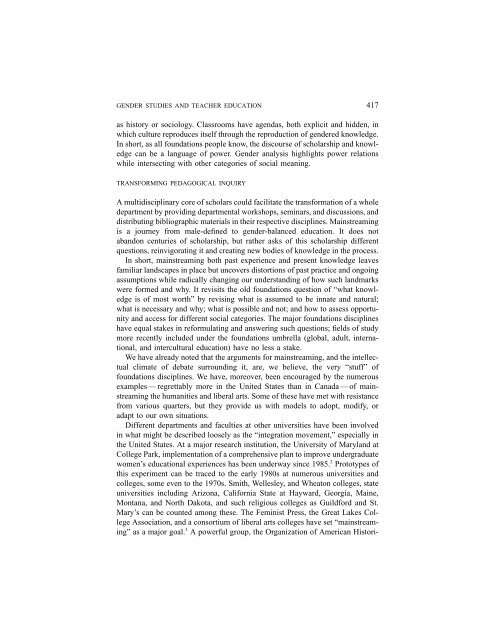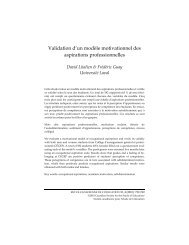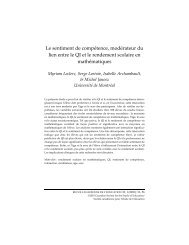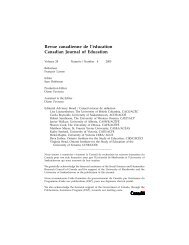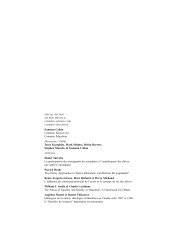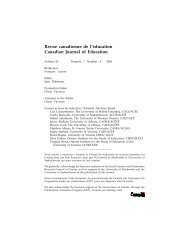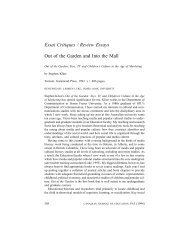Mireille Falardeau et Michel Loranger Le choix de stratégies ... - CSSE
Mireille Falardeau et Michel Loranger Le choix de stratégies ... - CSSE
Mireille Falardeau et Michel Loranger Le choix de stratégies ... - CSSE
You also want an ePaper? Increase the reach of your titles
YUMPU automatically turns print PDFs into web optimized ePapers that Google loves.
GENDER STUDIES AND TEACHER EDUCATION 417<br />
as history or sociology. Classrooms have agendas, both explicit and hid<strong>de</strong>n, in<br />
which culture reproduces itself through the reproduction of gen<strong>de</strong>red knowledge.<br />
In short, as all foundations people know, the discourse of scholarship and knowledge<br />
can be a language of power. Gen<strong>de</strong>r analysis highlights power relations<br />
while intersecting with other categories of social meaning.<br />
TRANSFORMING PEDAGOGICAL INQUIRY<br />
A multidisciplinary core of scholars could facilitate the transformation of a whole<br />
<strong>de</strong>partment by providing <strong>de</strong>partmental workshops, seminars, and discussions, and<br />
distributing bibliographic materials in their respective disciplines. Mainstreaming<br />
is a journey from male-<strong>de</strong>fined to gen<strong>de</strong>r-balanced education. It does not<br />
abandon centuries of scholarship, but rather asks of this scholarship different<br />
questions, reinvigorating it and creating new bodies of knowledge in the process.<br />
In short, mainstreaming both past experience and present knowledge leaves<br />
familiar landscapes in place but uncovers distortions of past practice and ongoing<br />
assumptions while radically changing our un<strong>de</strong>rstanding of how such landmarks<br />
were formed and why. It revisits the old foundations question of “what knowledge<br />
is of most worth” by revising what is assumed to be innate and natural;<br />
what is necessary and why; what is possible and not; and how to assess opportunity<br />
and access for different social categories. The major foundations disciplines<br />
have equal stakes in reformulating and answering such questions; fields of study<br />
more recently inclu<strong>de</strong>d un<strong>de</strong>r the foundations umbrella (global, adult, international,<br />
and intercultural education) have no less a stake.<br />
We have already noted that the arguments for mainstreaming, and the intellectual<br />
climate of <strong>de</strong>bate surrounding it, are, we believe, the very “stuff” of<br />
foundations disciplines. We have, moreover, been encouraged by the numerous<br />
examples — regr<strong>et</strong>tably more in the United States than in Canada — of mainstreaming<br />
the humanities and liberal arts. Some of these have m<strong>et</strong> with resistance<br />
from various quarters, but they provi<strong>de</strong> us with mo<strong>de</strong>ls to adopt, modify, or<br />
adapt to our own situations.<br />
Different <strong>de</strong>partments and faculties at other universities have been involved<br />
in what might be <strong>de</strong>scribed loosely as the “integration movement,” especially in<br />
the United States. At a major research institution, the University of Maryland at<br />
College Park, implementation of a comprehensive plan to improve un<strong>de</strong>rgraduate<br />
women’s educational experiences has been un<strong>de</strong>rway since 1985. 2 Prototypes of<br />
this experiment can be traced to the early 1980s at numerous universities and<br />
colleges, some even to the 1970s. Smith, Wellesley, and Wheaton colleges, state<br />
universities including Arizona, California State at Hayward, Georgia, Maine,<br />
Montana, and North Dakota, and such religious colleges as Guildford and St.<br />
Mary’s can be counted among these. The Feminist Press, the Great Lakes College<br />
Association, and a consortium of liberal arts colleges have s<strong>et</strong> “mainstreaming”<br />
as a major goal. 3 A powerful group, the Organization of American Histori-


